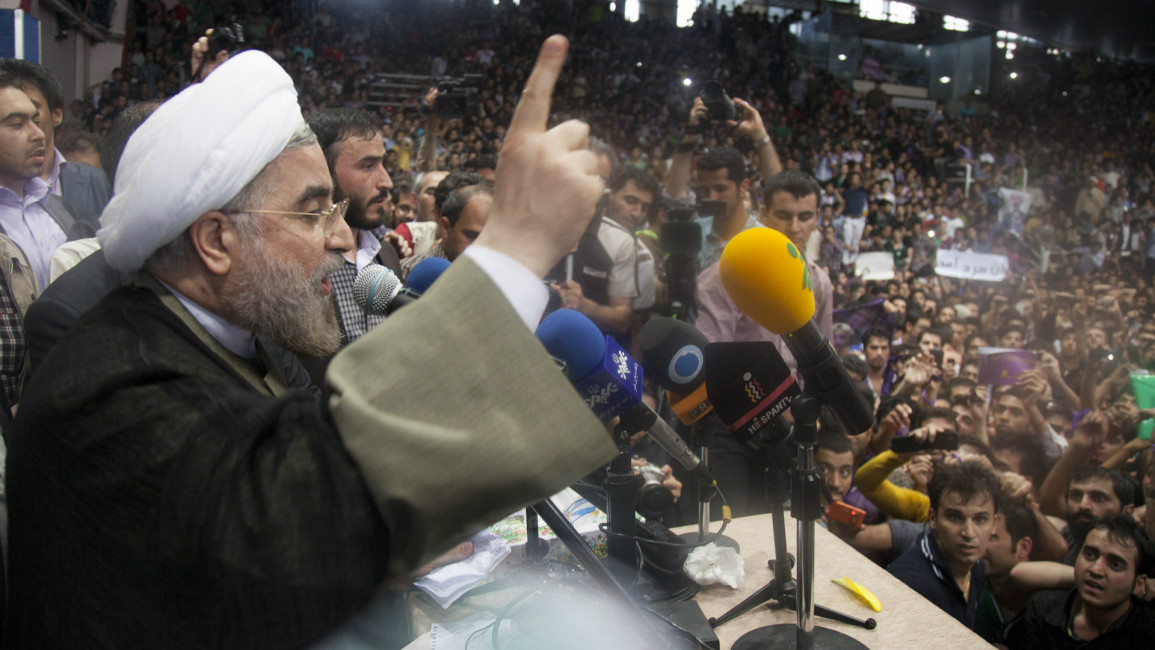
Khamenei's game of whack-a-mole: Rouhani's turn to be side-lined
After the nuclear deal, the next political issue in the minds of Iranian politicians and activists is the upcoming parliamentary elections in February 2016.
Rouhani has opened a can of worms by softly criticising the Guardian Council for its closed-minded vetting policies. His statement came after the Council announced that people who participated in the 2009 protests would be denied candidacy.
Right after Rouhani's statement, the IRGC commander-in-chief, Mohammad Ali Jafari, had some harsh words for him. Jafari, a Council member, mentioned even that "the Guardian Council has the authority to annul the whole election".
He was not alone. A platoon of authoritarian politicians, Friday prayer leaders and IRGC generals followed his lead and issued a spate of attacks against different Rouhani administration policies and Rouhani himself.
| The first Majlis was established when there was no Guardian Council and it was still the best - Hassan Rouhani, Iranian president |
They are worried about the state of Iranian domestic politics at a time that Rouhani has the highest political capital after negotiating the nuclear deal.
Back to the Khatami era
When Rouhani says: "The first Majlis was established when there was no Guardian Council and it was still the best," he questions the legitimacy of the totalitarian-style vetting and monitoring process of this council over the past thirty years.
One of Khatami's failed twin bills was to stop this unfair process - and he is still paying the price for his actions. Rouhani knows he is stepping into a minefield, but he has no choice other than to challenge Khamenei's loyalists if he wants to be a second term as president.
Rouhani has never claimed to be a reformer - but rather a lawyer and pragmatist. Based on his legal training, he says, "only the executive electoral bodies decide who is eligible to run in the elections… the Guardian Council just monitors the elections. The administration has to execute it".
As a politician, he believes that "the next Majlis does not belong to any faction or party".
New agenda
Rouhani's bid to influence the electoral process and diversify the parliament is not welcome among the political caste. His mission, in the eyes of the political establishment, was exclusively to end the sanctions.
His main political agenda during his campaign was to prepare the world to accept the nuclear deal. Now that the sanctions are removed, it is time for him to get involved in domestic politics. Simultaneously, it appears time for the military and religious establishment to degrade and marginalise him.
Guardians of the revolution
The marginalisation process for presidents usually begins with an IRGC attack - its main function being to protect the guardian jurist. The same happened to the Khatami and Ahmadinejad administrations.
Criticising Rouhani's comments over the Guardian Council, the IRGC commander-in-chief said: "People who are now administering the country through this council's favour and non-factional attitude should have more preserved statements."
The military commanders do not see any limitation in attacking or belittling any officials other than the supreme leader. Khamenei not only does not advise his commanders to stop meddling in political affairs, but also encourages them to get involved - and show that they have the upper hand over the elected politicians.
Jafari indirectly accused the administration of wanting to satisfy the enemies of the country and warned Rouhani himself to "close the windows through which the enemy could sneak".
The timing of these attacks is very important. The country is getting ready for political campaigns and negotiations for new coalitions are under way.
| The timing of these attacks is very important |
No-rival policy
Rafsanjani, Khatami, Ahmadinejad, Musavi and Karrubi received the same treatment and warnings before their demise from the ruling caste.
Khamenei's staunch loyalists called Rafsanjani "a short-sighted elite". Khatami, Karrubi and Musavi were referred to as "the masters of rebellion and discord", and Ahmadinejad a "religious crook".
Karrubi, a former Majlis speaker, and Musavi, the former prime minister, have been under house arrest for more than four years. Khatami is now prohibited from travelling abroad; Ahmadinejad's close circle are prosecuted one by one, and Rafsanjani's candidacy for the presidential election in 2013 was rejected - while his son was sentenced to 10 years in prison.
None of these former high-ranking officials, including presidents, the last prime minister and Majlis speakers, are able to be directly active in mainstream politics.
Politicians with decades of experience, thousands of followers and the ability to organise and mobilise are not able to participate in the next parliamentary elections.
Rouhani is the only one who could change this.
But he is target number one for the authoritarian faction to avoid sharing seats with reformers in the Majlis.
Appointment criteria
Iranian domestic politics for Khamenei has been a game of whack-a-mole - in which the main player uses a mallet to hit rising politicians, which appear at random, back into their holes.
He picks IRGC commanders, judiciary officials, Friday prayer leaders and his office members based on their readiness to play his game. Khamenei has been very successful - and all former high-ranking officials are under house arrest, travel bans, prosecution and media restrictions.
Majid Mohammadi is an Iranian-born academic, and the author of several books in Persian and English on politics, arts and religion in Iran.
Opinions expressed in this article remain those of the author and do not necessarily represent those of al-Araby al-Jadeed, its editorial board or staff.




